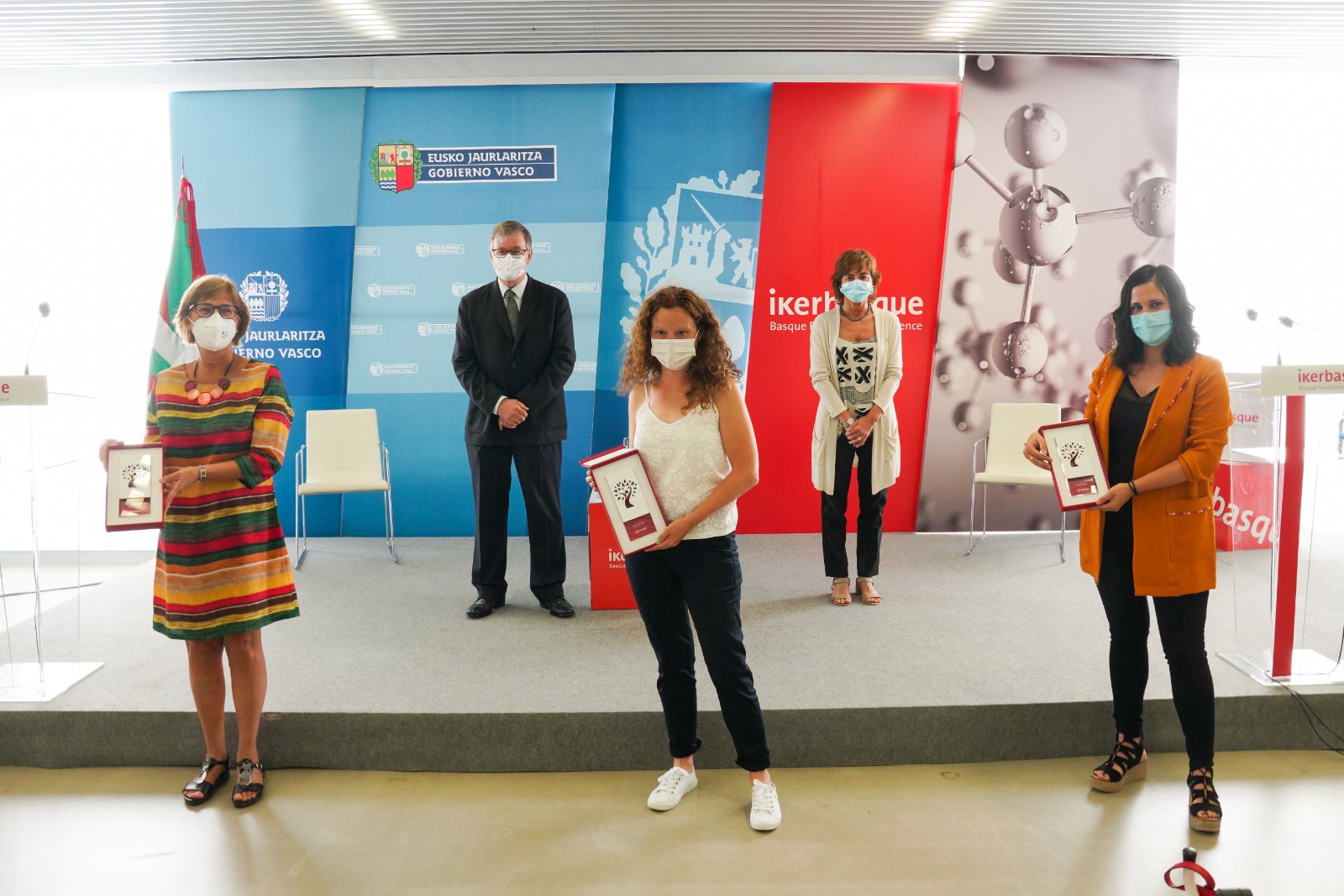
The Minister of Education and President of Ikerbasque Cristina Uriarte presided over the delivery of the awards to three women who carry out their research work in the Basque Country: Helena Matute, Clara Martin and Matxus Perugorria. The event was attended by Fernando Cossío, Scientific Director of Ikerbasque, as well as the presence of the Deputy Minister for Universities and Research Adolfo Morais, the rector of the UPV/EHU Nekane Balluerka and those responsible for the Basque system of science and innovation.
This is the second edition of the awards to women researchers organized by Ikerbasque and also on this occasion the research work has recognized three categories: to a whole scientific career, leadership in a field of research and an outstanding contribution of a young woman researcher.
The recognition of the entire research career has been for Helena Matute (1960). Helena is Professor of Psychology and director of the Laboratory of Experimental Psychology at the University of Deusto. She has been a visiting researcher at the universities of Malaga, Ghent (Belgium), Minnesota (USA), Sidney, and Queensland (Australia). She investigates the functioning of learning, cognitive illusions, and decision-making, as well as the application of these phenomena to current problems such as pseudosciences, disinformation, and the influence that artificial intelligence can have on decision-making and human conduct. She has been President of the Spanish Society of Experimental Psychology, and a member of the Scientific Advisory Council of FECYT, the Spanish Foundation for Science and Technology. She is an academic member of Jakiunde, the Academy of Sciences, Arts and Letters of the Basque Country. She is also a science dissemination enthusiast and her outreach work has been recognized with the Prisma Award for Best Scientific Disclosure Book and the JotDown-DIPC Award for Best Scientific Disclosure Article.
Clara Martin (1978) has been recognized for her leadership in the field of multilingualism. After receiving a PhD in Cognitive Neuroscience from the University of Lyon, she completed several postdoctoral stays at the University of Bangor in North Wales and at the Pompeu Fabra University in Barcelona, where she specialized in the field of bilingualism and multilingualism. In 2012, she joined BCBL as an Ikerbasque researcher to lead the Language and Bilingualism research group. In 2019, she was one of the 16 people selected in Spain to develop a research project in the framework of an ERC-Consolidator Grant, funded with a total of 1.9 million euros, with the objective of knowing how spelling affects perception and the production of sounds of the language of minors while they are learning to read.
Lastly, Matxus Perugorria (1981) has been recognized for her outstanding contribution to the field of chronic liver damage and the development of primary liver cancers; hepatocarcinoma and cholangiocarcinoma. She obtained her doctorate at the University of Navarra where she studied the molecular mechanisms involved in the progression of liver injury. Later she made a postdoctoral stay at the University of Newcastle and several stays at the University of Paris and the University of Vienna. In 2012, Dr. Perugorria joined the Biodonostia Institute to create and lead a research group focused on the study of the molecular mechanisms involved in the progression of chronic liver damage and liver cancer. A year later she was selected as an Ikerbasque Fellow and since 2017 she is a Ramón y Cajal Researcher at the University of the Basque Country (UPV/EHU).
To select the recognized researchers, Ikerbasque has carried out an analysis of the scientific production data and the latest outstanding contributions from more than 300 researchers from the Basque Country. The final selection was carried out by a Delegate Commission of the Ikerbasque Board of Trustees, validated by the Foundation's Scientific Committee.
In 2018 Ikerbasque developed its equality plan for men and women, following the methodology proposed by Emakunde. As a result of this process and with the aim of advancing on the path to equality, 7 actions were proposed, among which was the recognition of women researchers. In 2019 the first edition of the recognition to female researchers was held.
Ikerbasque tries with these measures to reverse gender stereotypes that affect that many female researchers abandon their scientific careers in the initial stages, and that on many occasions they are invisible to their male colleagues. Therefore, the main objective of this action is to make the careers of brilliant female researchers visible, to recognize their contribution to science and thus serve as a model for future generations.
.png)
